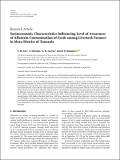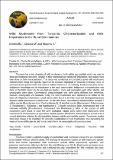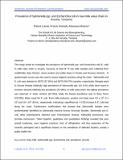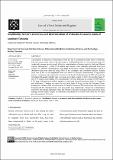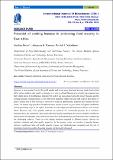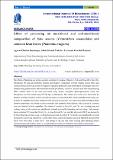Search
Now showing items 31-40 of 49
Socioeconomic Characteristics Influencing Level of Awareness of Aflatoxin Contamination of Feeds among Livestock Farmers in Meru District of Tanzania
(Hindawi, 2018-04-30)
Aflatoxins occurrence in feeds challenges human and animal health. Farmers’ awareness status of these toxins has an effect on their level of exposure. The study assessed the influence of socioeconomic characteristics of ...
An In Vitro Evaluation of the Capacity of Local Tanzanian Crude Clay and Ash-Based Materials in Binding Aflatoxins in Solution
(MDPI, 2018-12-03)
Aflatoxins in feeds cause great health hazards to animals, and thus eventually to humans
as well. The potential of clays from Arusha (AC), Kilimanjaro (KC), the Coast (CC), and Morogoro
(MC), as well as volcanic ash (VA) ...
Wild Mushrooms from Tanzania: Characterization and their Importance to the Rural Communities
(Current Research in Environmental & Applied Mycology, 2015-10)
Tanzania has a rich diversity of wild mushrooms, both edible and inedible which are used as
food and medicinal resources. Despite of their nutritional and medicinal importance, few studies have
been done on their ...
Prevalence of Salmonella spp. and Escherichia coli in raw milk value chain in Arusha, Tanzania
(American Journal of Research Communication, 2014)
This study aimed to investigate the prevalence of Salmonella spp. and Escherichia coli (E. coli)
in milk value chain in Arusha, Tanzania. A total of 75 raw milk samples were collected from
smallholder dairy farmers, ...
Physicochemical Quality of Street Vended Roasted Cashew nuts in Tanzania
(American Journal of Research Communication, 2014)
Moisture content and pH values are very important factors for fungal growth of roasted cashew
nuts. A survey to investigate storage practices of roasted cashew nuts was conducted along the
Coastal regions. Physicochemical ...
Smallholder farmer's awareness and determination of aflatoxins in sesame seeds of southern Tanzania
(Journal of Food Safety and Hygiene, 2022)
Consumption of aflatoxins contaminated foods has led to detrimental health effects worldwide, with even more severe cases in African countries including Tanzania. A cross sectional study was conducted to assess awareness ...
Chapter 8 - Current trends and opportunities of plant-based non-alcoholic probiotic beverages: A European and African perspective
(Elsevier, 2021-05)
Although dairy-based foods have been the main probiotic food sources, a range of plant-based products are currently being developed to meet the needs of vegetarians, lactose intolerant persons, individuals on low cholesterol ...
Potential of cooking bananas in addressing food security in East Africa
(International Journal of Biosciences, 2018-10-30)
Banana is a very popular fruit in the world market and serves as an ideal and low-cost staple food in East
Africa whose residents rely mostly on bananas as a source of food. Banana is practically non-seasonal crop
that ...
Effect of processing on nutritional and anti-nutritional composition of false sesame (Ceratotheca sesamoides) and common bean leaves (Phaseolus vulgaris)
(International Journal of Biosciences, 2019-08-19)
The effects of blanching and drying on micro-nutrients: β-Carotene, Vitamin C, Folic acid, Iron (Fe), Zinc (Zn),
Phosphorus (P) and anti-nutrients: Tannins and Oxalates composition of False Sesame Leaves (FSL) and
Common ...
Assessment of Water Absorption Capacity and Cooking Time of Wild Under-Exploited Vigna Species towards their Domestication
(MDPI, 2019-09-04)
Some phenotypic traits from wild legumes are relatively less examined and exploited
towards their domestication and improvement. Cooking time for instance, is one of the most central
factors that direct a consumer’s ...

